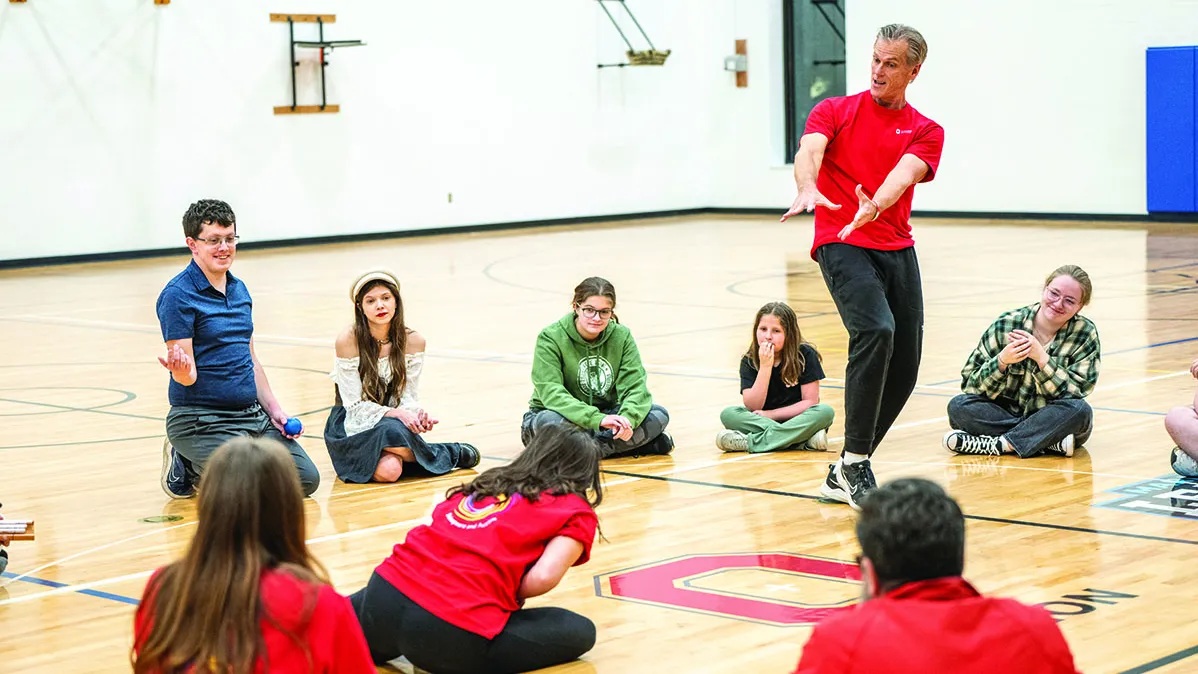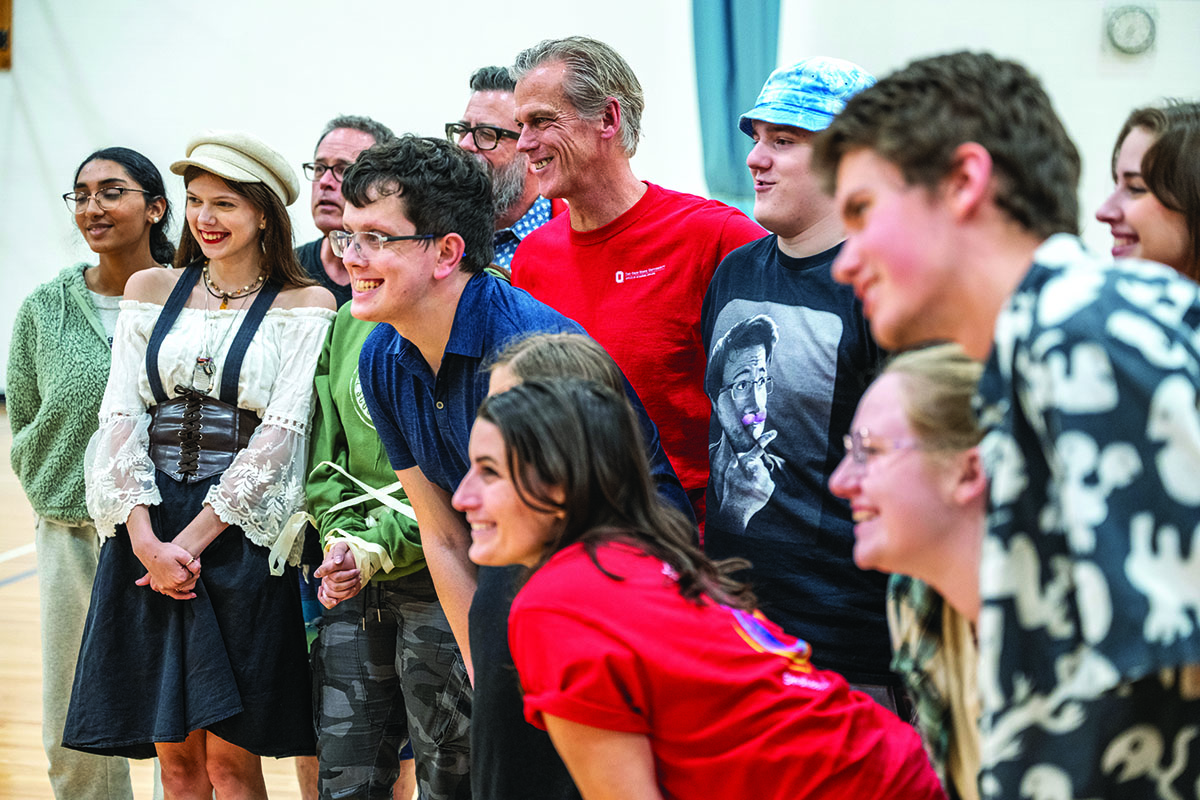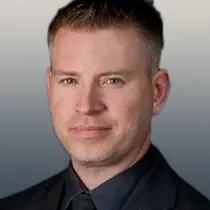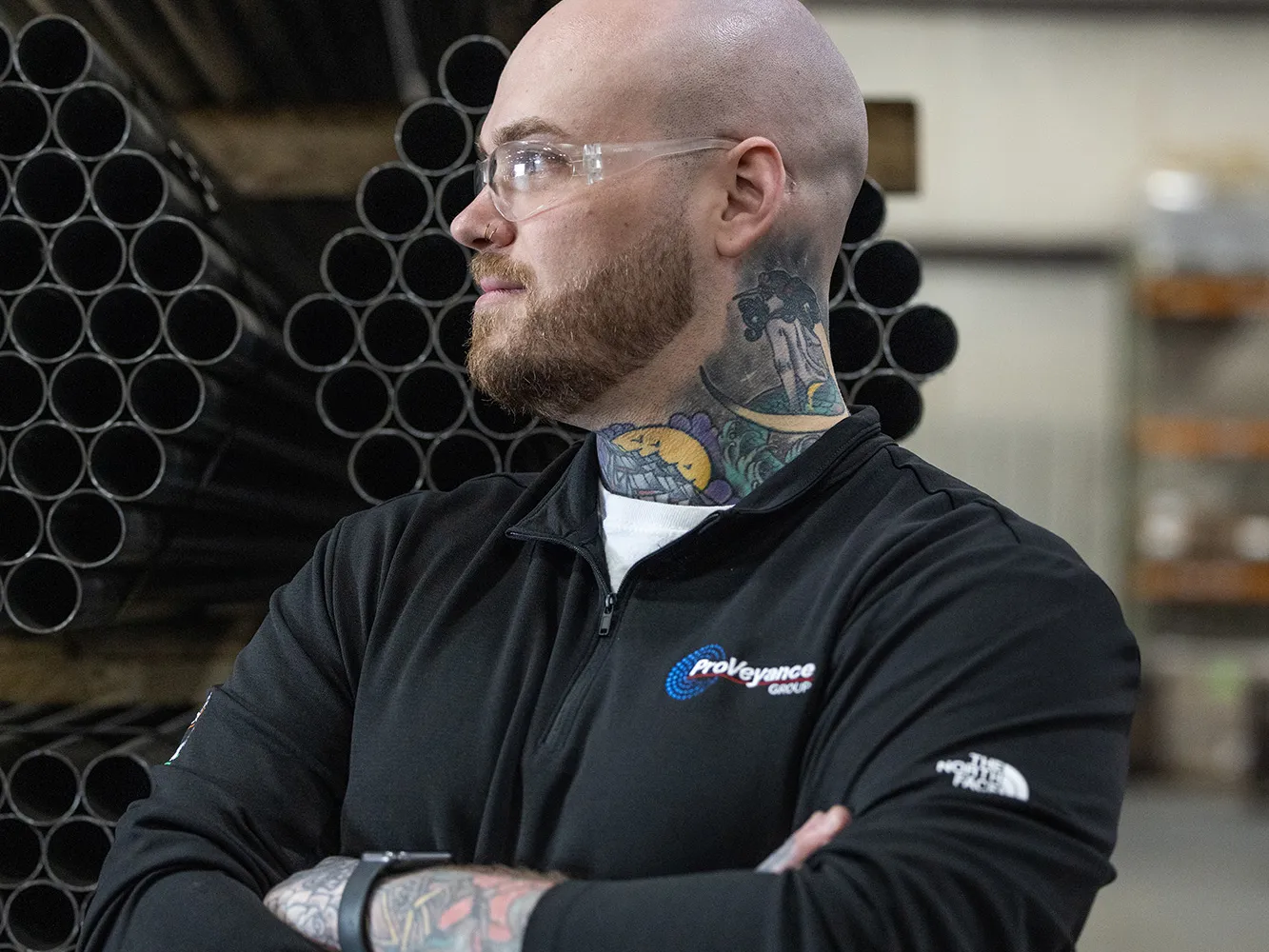Kevin McClatchy uses supporting role to help kids
The actor, associate professor and Ohio State’s 2024–25 artist laureate taps his theatrical talents (and Shakespeare’s poetry) to inspire children with autism and veterans.

Kevin McClatchy conducts a Shakespeare and Autism Project workshop at Ohio State Marion. (Photo by Logan Wallace)
Kevin McClatchy ’12 MFA has got cramps, bad ones from the looks of it: face contorted, hands clutched to his side, body convulsing. “Better,” says a young girl, clapping her hands, and McClatchy snaps out of it.
The pair are performing a theatrical exercise inspired by Shakespeare’s “The Tempest.” McClatchy is Caliban, a slave tormented by the magician Prospero, played by the girl. McClatchy and his partner circle each other, a smile growing on the girl’s face. Her hands shoot out, and she yells, “Cramps!” Once again, McClatchy is racked with pain.
Afterward, they’re all smiles. “There’s nothing more pleasurable than faking violent cramps and then being made better,” McClatchy jokes.
The girl is on the autism spectrum. And in a very real sense, McClatchy is just playing a game with her during a Shakespeare and Autism Project workshop. What participants don’t know is through these games, McClatchy and his students are helping them become comfortable with eye contact, spatial awareness, social and language skills—often obstacles for those with autism.
As director of the Shakespeare and Autism Project since its inception at Ohio State, McClatchy has had his eyes opened as well. “If you want to learn about resiliency and authenticity, just spend time with autistic individuals at one of our workshops,” says Ohio State’s artist laureate for 2024–25. “It’s also so much fun, and it lightens your load.
“You learn a lot about yourself. It enlarges you as an artist, as a human being, a citizen of the world. I’ve become a better actor, a better teacher, a better husband and a better father.”
McClatchy is an associate professor in the Department of Theatre, Film, and Media Arts, where he oversees the acting curriculum. An accomplished stage and screen actor with a healthy IMDb page, McClatchy helped create and mold Ohio State’s Shakespeare and Autism Project as a graduate student when it began with a pilot study in 2011.
“When we first started doing these workshops, I was the walking, talking epitome of imposter syndrome,” recalls McClatchy, neither a Shakespeare nor an autism expert. Yet he became comfortable in the role by being present, responsive and empathetic in the moment. “That’s all I needed,” he says.

Through the Shakespeare and Autism Project, McClatchy has reached more than 400 children and trained over 100 students in the Hunter Heartbeat Method, a theatre-based intervention that taps the rhythm of Shakespeare’s language. “Kevin just amazes me with how he is able to adapt these interventions to each child,” says Marc Tassé, director of the Nisonger Center, Ohio State’s research and patient care facility that develops programs for people with neurodevelopmental disabilities such as autism.
Tassé helped conduct the pilot study, which showed the Shakespeare program was effective in helping autistic children. “Sometimes, some of the participants are slow to engage, and Kevin finds ways to personalize that intervention to elicit their participation. And he conveys that to his students who then grow and learn a lot about autism.”
It’s not lost on the participants, or their parents. “Kevin is so enthusiastic,” says Stefanie Rivers ’92 MA, a Columbus school psychologist who has had three of her boys participate. “You can tell he loves the kids by the way he works with them, and they love him.”
This past school year, as Ohio State’s artist laureate, McClatchy took the program outside Columbus for the first time, conducting workshops in Cleveland, Athens, Marion, Lima and Licking County. At the Licking County workshop, Kandee Engle took the training and participated in the workshop with her daughter, Skyler.
“It was super outside my comfort zone to do something like this, but Kevin is just so engaging, and his students drew us in,” Kandee says. “It was just a wonderful, shared experience.”
Many who took part in the fall workshops say they would love for the program to grow in their communities and are even beginning to take steps to do that. In similar fashion, McClatchy also works in the veterans’ community, through a Shakespeare and Veterans program but also with his one-man play “Scrap Heap,” which he toured around Ohio
this winter.
“Scrap Heap” tells the story of a soldier returning to civilian life while combating PTSD. It’s based on the experience of a close friend, though the military service of McClatchy’s father and nephew also inspires his work. Following a performance, a facilitator from the local community invites veterans to share their stories for discussion.
“The play is very well done. I’m very supportive of Kevin’s work,” says Professor Peter Mansoor ’92 MA, ’95 PhD, General Raymond E. Mason Jr. Chair in Military History and a retired U.S. Army colonel. “What helps a veteran most is talking to other veterans. The play plus discussion with other veterans in the context of the play can bring trauma to the surface and help someone deal with it.”
Since transitioning from solely focusing on acting roles to civic engagement, McClatchy says, he’s witnessed the true potential of his artistry. “Everyone talks about the power of art in the abstract,” he says. “Well, this is what it is. It’s no different from seeing ‘Schindler’s List’ and being outraged or having your faith in humanity restored. Or hearing a piece of music that moves you.
“We don’t have agendas; we’re just offering opportunities to strengthen things that may help someone navigate the world. But through this work, we get as good as we give. It’s gratifying, and it’s humbling.”
More McClatchy
The Now at Ohio State podcast featured Kevin McClatchy and colleague Angelina Steshenko ’25 MFA in a recent episode focused on the Shakespeare and Autism Project.



